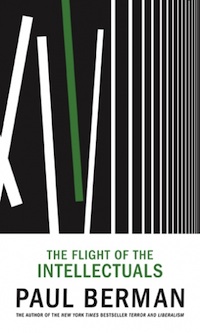Birds Without Wings

There may be a tendency to dismiss intra-left political conflicts with a version of the old saw about literary squabbles—that is, the reason they are so impassioned and contentious is they argue about so little. Though there are jokes to be made about the apparent self-destructiveness of the Left (I am baffled as to why we still rely on an antiquated political taxonomy), there are real-world consequences of left doctrinal and philosophical slugfests.
Paul Berman (Terror and Liberalism), whom I admired back during the Reagan Follies for his sympathetic stand on Nicaragua’s plight during its assault by the usual claque of American imperialist cowboys, has, like Christopher Hitchens, complicated his identity and baffled longstanding admirers by supporting the Iraq Disaster and is now, based on his new manifesto, The Flight of the Intellectuals (Melville House), once more engaged in rhetorical fisticuffs with other so-called liberal intellectuals (a label that in the popular culture no doubt discredits the whole pack of them). This to-and-fro is, as far as I can tell, well documented in what seems to be the still-existent New York Observer.
Involving such formidable writers and thinkers such as Tony Judt, Ian Buruma, and Mark Lilla, the gloves are apparently off when you read Buruma unflatteringly describing Berman: “He gets very emotional. He gets very excited… a lot of spittle around the mouth and so on. You don’t really need that.”
The crux of Paul Berman’s concern (first aired in his New Republic response to Ian Buruma’s New York Times Magazine profile of influential Swiss-born Egyptian scholar and devout Muslim and Oxford professor Tariq Ramadan) is the fact that Ramadan happens to be the Muslim Brotherhood founder Hassan al-Banna’s grandson. Berman contends that though there are a host of eloquent critics of Islamic fundamentalism/extremism, Tariq Ramadan is not to be trusted and in fact may be the proverbial wolf in sheep’s clothing.
You can also follow some of this brouhaha in Dwight Garner’s review, which concludes:
Ayaan Hirsi Ali
